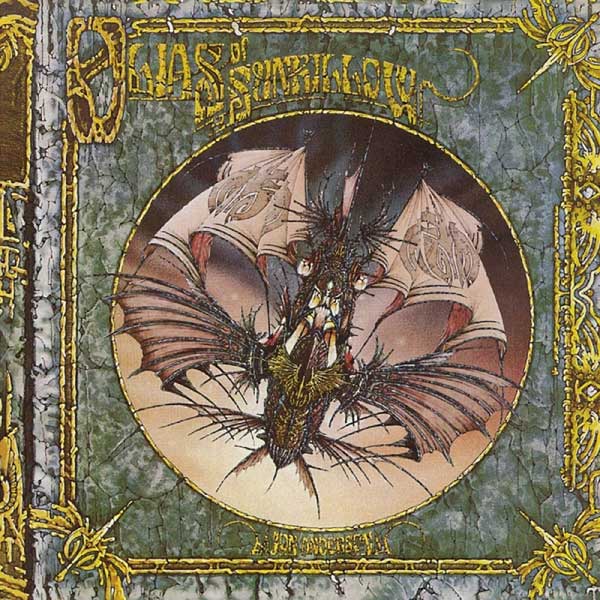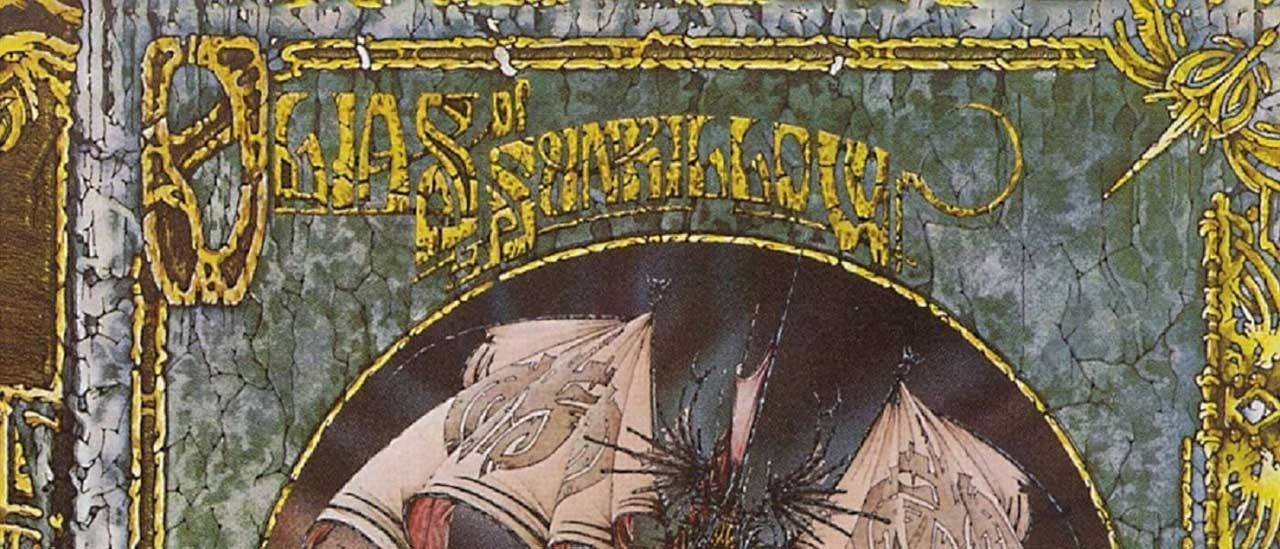You can trust Louder

Ocean Song
Meeting (Garden of Geda)/Sound Out the Galleon
Dance of Ranyart/Olias (To Build the Moorglade)
Qoquaq Ën Transic/Naon/Transic Tö
Flight of the Moorglade
Solid Space
Moon Ra/Chords/Song of Search
To the Runner
A single-disc, eight-song tale of an alien race that’s forced to flee to a new world in the wake of a volcanic catastrophe, Olias Of Sunhillow might sound utterly preposterous on paper though it’s widely viewed as Jon Anderson’s defining release away from the Yes mothership.
Only Accrington’s most famous cosmic pixie could get away with a song (Moon Ra) that uses of the lines: ‘Worlds that lie between/Are simply seconds of words we do not mean/Cast a pastel sky/Or simply wonder until the day you die’, but be prepared to leave such qualms at the door because Olias Of Sunhillow is beautiful, uplifting, intoxicating and wholly irresistible.
Conceived just after the sessions for Yes’s Relayer and released in mid-1976 with Anderson handling all of the instrumentation as well as slipping into a variety of vocal characters, it’s a surprisingly low-key but rewarding piece of work that gently warms the cockles of the coldest and most cynical heart. Besides the so-called traditional range of rock staples, he uses harp, sitar, flutes, mandolin and koto to stitch together an exotic-sounding tapestry of sounds.
Solid Space begins with a fruity keyboard line that Anderson uses as a jumping-off point for some of the most wonderfully versatile vocals that you might ever hear. And at almost 13 minutes long, Moon Ra, Chords and Song Of Search are an interlinked trilogy that stands as the album’s piece de resistance. Occasionally keyboard-dense and other times in the new age vein, the effect is never less than hypnotic.

Every week, Album of the Week Club listens to and discusses the album in question, votes on how good it is, and publishes our findings, with the aim of giving people reliable reviews and the wider rock community the chance to contribute.
Sign up below to get the latest from Classic Rock, plus exclusive special offers, direct to your inbox!

Other albums released in July 1976
- Big Ones - The Beach Boys
- The Clones Of Dr. Funkenstein - Parliament
- Child In Time - Ian Gillan Band
- Howlin' Wind - Graham Parker And The Rumour
- More Than Ever - Blood, Sweat & Tears
- Year Of The Cat - Al Stewart

What they said...
"Olias of Sunhillow is faithful to the spirit of Yes, though decidedly more airy than that band's visceral style -- its closest comparison would be Fragile's We Have Heaven or Going for the One's Wonderous Stories (which was clearly influenced by this record) on the vocal tracks, and Greek progressive electronic composer (and future Anderson collaborator) Vangelis on the instrumental tracks. (AllMusic)
"The new age/tribal meets with a kitchen sink being thrown in in the Qoquac En Transic/Naon/Transic To part, something that would surface in the shamanic Awaken epic that would grace Going For the One when Yes went into the studio again. Such may have been the influence of Olias and the growing confidence Anderson had (not that ‘the hippy with the iron fist’ ever lack conviction, drive and purpose) in his visions. (At The Barrier)
"There’s a dangerous swerve towards the New Age in Anderson’s first solo album, both in the optimistic whimsy of its fantasy world, and the musical palette of soft, sparkling synths and World instruments. Thankfully, it easily escapes that particular doldrum of musical Hell through sheer energy (on the musical front) and sheer weirdness (on the fantasy front). This isn’t music to attune your chakras to, it’s adventurous, full of drama, uplifting melodies, evocative soundscapes, and a fresh unearthliness that makes it the only fantasy album I can think of which genuinely sounds like it could have come from another world." (Mewsings)

What you said...
Philip Qvist: My goodness, but that was a strain. I gave up in the end as the worst of Prog Music was on display here; self-indulgent, excessive for the sake of being excessive, with incoherent lyrics and a nonsensical storyline to match. I know some people will see a certain charm in that - but definitely not me.
Not a pleasant album at all. Suddenly, the arrival of The Clash and The Sex Pistols now makes perfect sense.
Mike Bruce: Yes, yes, yes we all know that this album can easily decried for it's sixth form science fiction storyline and it's use of a made up language for some of its lyrics.
The music may not be to the taste of all either, to say the least!
It's an album then, that's an easy target for for people to to throw their critical stones at, living proof that it's easier to knock something down than to build something up and boy, was something built here.
Drawing inspiration from a number of cultures, the music is at times dense and rhythmic at others languid and fragile. It's a lush, verdant musical landscape that rewards repeated exploration.
For all it can be viewed as a touch twee, the story is ultimately hopeful and uplifting. For me it was a vaccination against much of the bleak nihilism and empty hedonism that followed rather than a reason it had to happen.
Punk "had to happen" because of what wasn't being given space to grow and prosper rather than what was. Just look around now. You could count till next Christmas and not catalogue all the genres and sub-genres that coexist quite happily, thank you very much.
I'm actually quite fond of a bit of bleak nihilism and especially empty hedonism, just don't try to tell me it's better than this.
There's room in the sky for the cloud and crow alike.
Chris Haggstrom: I thoroughly enjoyed revisiting this album after many years, and in this case, absence has indeed made the heart grow fonder.
Of course, it's not a Yes album. And admittedly, it sometimes makes me picture Ewoks celebrating a victorious battle on Endor. But it's also a charming piece of exploration and self-indulgence that helps one better understand Jon's influences and talents, and how those were applied in the context of Yes, Anderson Bruford Wakeman Howe, and also his later collaborations with Vangelis.
Is the album a "success", per se? I'd say yes, in that It gave Anderson a chance to assess and explore his abilities outside of the compromise and combativeness of a group dynamic. And while apparently exhausting, Olias probably helped recharge his creative batteries.
I think of this album as similar to Steve Hackett's Voyage of the Acolyte (released one year earlier), where a band contributor was finally free to show their own uninhibited musical vision. And without a doubt there are some beautiful moments of musicality and expressiveness on guitar and harp, making Olias, I suppose, my favourite harp album.
Bill Griffin: Olias of Sunhillow is a great album, all the more so because Jon played all the instruments himself. Easily as good as what Yes were doing at the time. I have no qualms about giving this a 10.
Matthew Joseph Hughes: 10 from me. This album is wonderful.
John Davidson: Even when I was a lad and listened to a lot of Yes, I thought this was an inferior effort to any of the Yes albums.
It's an album made almost entirely out of the glitter that Anderson adorned the complex jazzy/rocky structures of Yes and while it's impressive that Jon Anderson performed all the music himself it's no substitute for the real thing.
Oh and the lyrics are entirely mystical gibberish. With bells on.
Jim Collins: You can't forget the gorgeous packaging on the original vinyl. The gatefold sleeve, beautiful illustrations and the all lyrics, I spent many stoned hours listening to and reading that album. 8/10
Paul Maguire: Anderson himself said he almost went mad recording this. Still a 10.
Keith Jenkin: A wonderfully packaged and suitably eccentric release that probably could only have been made in the mid seventies, but when it comes to Yes member solo albums I think the similarly timed releases from Chris Squire and Patrick Moraz are the ones that have aged much better and have the best tunes.
Robert Dunn: I tried. Honestly, I really tried. I am not against concept albums as such, I loved SF Sorrow, but this just had too much twiddle going on for me. I don't mind gibberish lyrics either, but self-indulgence on this scale shouldn't really be encouraged.
If we must do an album where the artist takes control, can't we do What's Going On instead? Maybe not classic rock, but I am not sure that this is either.
Caleb Bradley: this is a terrible record.
Gary Claydon: If you're ever in any doubt as to why punk had to happen, just give Olias of Sunhillow a listen. Pretentious, self indulgent twaddle. I don't mind "mystic gibberish" one bit but this is just nonsense. I'll score it an extra mark for the fact that Anderson sung and played every note. I'm sure I've read several times - fairly recently as well - that he still intends to make a follow-up album using the same concept. God help us. 3/10
Richard Slee: Great packaging, lousy music. Too much twiddle and no tunes.
Todd Jones: I can only surmise that people calling this album 'mystic gibberish' and the like are below a certain age. Very possibly not even alive at the time of its release. This is almost certainly abbeted by a dashed expectation of hearing more 'Yes' songs. And trust me, nobody that listened to or created punk rock was influenced by it one way or another.
Olias, while not everybody's cup of tea, was an outstanding musical achievement by Jon Anderson, both in terms of creativity and personal musical performance and production, especially given the technology at the time. Everything had to be performed live. No samples, loops, Pro Tools, etc. Plus the artwork is second to none, at that includes any Yes album.
Adam Ranger: I do like Yes, Close To The Edge and The Yes Album being my particular favourites.
In many ways this album is not dissimilar to a Yes album of the 70s. But to me it lacks the substance of those albums. Very impressive that Anderson played all instrument etc on this album. It is in every sense a solo record.
However, I feel much of the album is "noodling" and needs a fuller sound, something a group of other musicians might have given it. Nowhere is this more apparent than on 12 minutes of From Ra/ Chords... For me Flight Of The Moonglade and To The Running are the only tracks that bear re listening
Chris Elliott: Elevator music for a tofu factory. That's being kind. It has few redeeming features and after 50 years it really should be consigned to history. Yes were great - this has a pretty sleeve and it goes downhill from there.
Duncan Godfrey: I'm a massive Yes freak but always felt their solo projects were inconsistent. This wasn't my cup of tea at all. In fact there's only one solo album that's on a par with the Yes material and that is Chris Squire's Fish Out Of Water which is simply sublime.
Richard Cardenas: Finally got around to listening to this record and I really enjoyed it. 8/10.
Greg Schwepe: Sometimes, it appears, you can judge a book by its cover. Or, in this case, an album by its cover. Well, the cover, and the album title, and some of the weirdly spelled song titles, and the album artwork and the graphics.
Being a Yes fan and obviously having heard Jon Anderson’s vocals and listened to his lyrics, this was exactly what I was expecting with Olias Of Sunhillow. Based on the vibe of the cover, could this be slightly ethereal music to listen to while you traipse around…well, maybe not Middle Earth, but certainly the neighbourhood next door? Yes! I totally nailed it before I even hit the 'Play' button to hear Ocean Song.
And the funny thing is that by the time I got through the final track To The Runner, and you’ll notice I said I got through the final track, I realised it’s not a bad album. My first test on any album review is always “can I make it through without hitting the 'Stop' button and saying 'man, this sucks'?” Oh, this one had its quirky moments, but there were enough good moments to keep my interest.
Sure, there were a lot of dreamy, celestial sounding synthesisers here, lots of chimes, bells, and the like. But somehow it all didn’t seem too “new age-y” to me. This is definitely a good “something to drift off to sleep to” album.
A lot of the songs feature layered, almost chanting-like vocals. Some tracks it seems like you’ve got four Jon Andersons harmonising with each other and they almost sound like background vocals. It's like Anderson created these tracks, but never put an upfront vocal on the track.
Now here’s where I find the funny irony about this album. This album was picked after the lyrics to last week’s Live album were compared to “Jon Anderson’s mystic gibberish” (Thanks John Davidson, that may become the Club’s catch phrase!). Because most of the tracks have the aforementioned layered background vocal phenomenon, there are only a few songs with an outright lead vocal front and centre in the mix. And due to that missing, I can’t even hear or barely remember any of the mystic gibberish! Nothing seemed to really stick out!
Again, this album was exactly as expected. Will it end up as a top listen in my Spotify Wrapped summary next year? Pretty sure that’s a big “no.” Is it a good listen for a Yes fan that will listen to any solo stuff put out by the band members? Yes. 7 out 10 on this one. For more upfront vocals and a more straightforward album, check out Song of Seven too.
Alex Hayes: Oh my God, that was bloody hard work. I'm a long standing Yes fan, and proud of it, but that was almost torturous to sit through. For the life of me, I can't imagine how anyone could give this album a regular spin, and certainly not for pleasure.
What's even worse, is that I really wanted to enjoy this. As I just mentioned, I've been a fan of the Yes mothership for many, many, years now, and was initially quite pleased to see Olias Of Sunhillow get nominated this week. I'd never actually heard the album before. 'Why is that the case, if you're such a Yes diehard?' would be a perfectly legitimate question to ask.
The answer is that I've never seen the appeal of side projects in general. Not necessarily from members of Yes, but any established act really. They are never as satisfying to me as full-on band projects, as the chemistry that made those respective musicians famous as a musical unit in the first place is often missing. Most solo albums miss the mark for me, being little more than mildly interesting diversions at best.
Am I interested in a solo album from, say, Steven Tyler? No, not really. I'd much prefer it if he would just stop arsing about, and get back in the studio with the other members of Aerosmith. Perhaps together they could cook up something special for that one last time. You never know.
And, occasionally, projects like this end up being nothing less than full-blown, self indulgent follies, a term which sums up Olias Of Sunhillow pretty well I feel. This is Jon Anderson given free reign to indulge in his New Age fripperies 100%, without any unwelcome input from the likes of Steve Howe. The end result is a 43 minute concept piece, a sound collage almost, comprising electronica, world music, chanting, rudimentary instrumentation and (yep, I'm going there) mystic gibberish. The 12 and a half minutes that comprise Moon Ra, Chords and Song Of Search were particularly difficult to stomach. Moon Ra? Wasn't he a villain in those old Thundercats cartoons? Ho!
As an album, it's a decent idea that's been taken way too far. I suddenly have a newfound appreciation for Sides 3 and 4 of Tales From Topographic Oceans. Compared to Olias Of Sunhillow, even Teakbois almost comes across as vintage Yes (I know, that song is technically ABWH, not Yes itself). Almost, but not quite. I need to listen to The Yes Album, Close To The Edge and Relayer. I need to get the balance back. I need equilibrium. I need to watch some Thundercats.
Apologies to Jon Anderson, a performer that I usually hold in very high regard. I just couldn't get on board with this music at all. I can't bear the thought of giving this album a second full listen through, so I won't be doing. 3/10

Final score: 5.68 (57 votes cast, total score 324)
Join the Album Of The Week Club on Facebook to join in. The history of rock, one album at a time.
Classic Rock is the online home of the world's best rock'n'roll magazine. We bring you breaking news, exclusive interviews and behind-the-scenes features, as well as unrivalled access to the biggest names in rock music; from Led Zeppelin to Deep Purple, Guns N’ Roses to the Rolling Stones, AC/DC to the Sex Pistols, and everything in between. Our expert writers bring you the very best on established and emerging bands plus everything you need to know about the mightiest new music releases.


